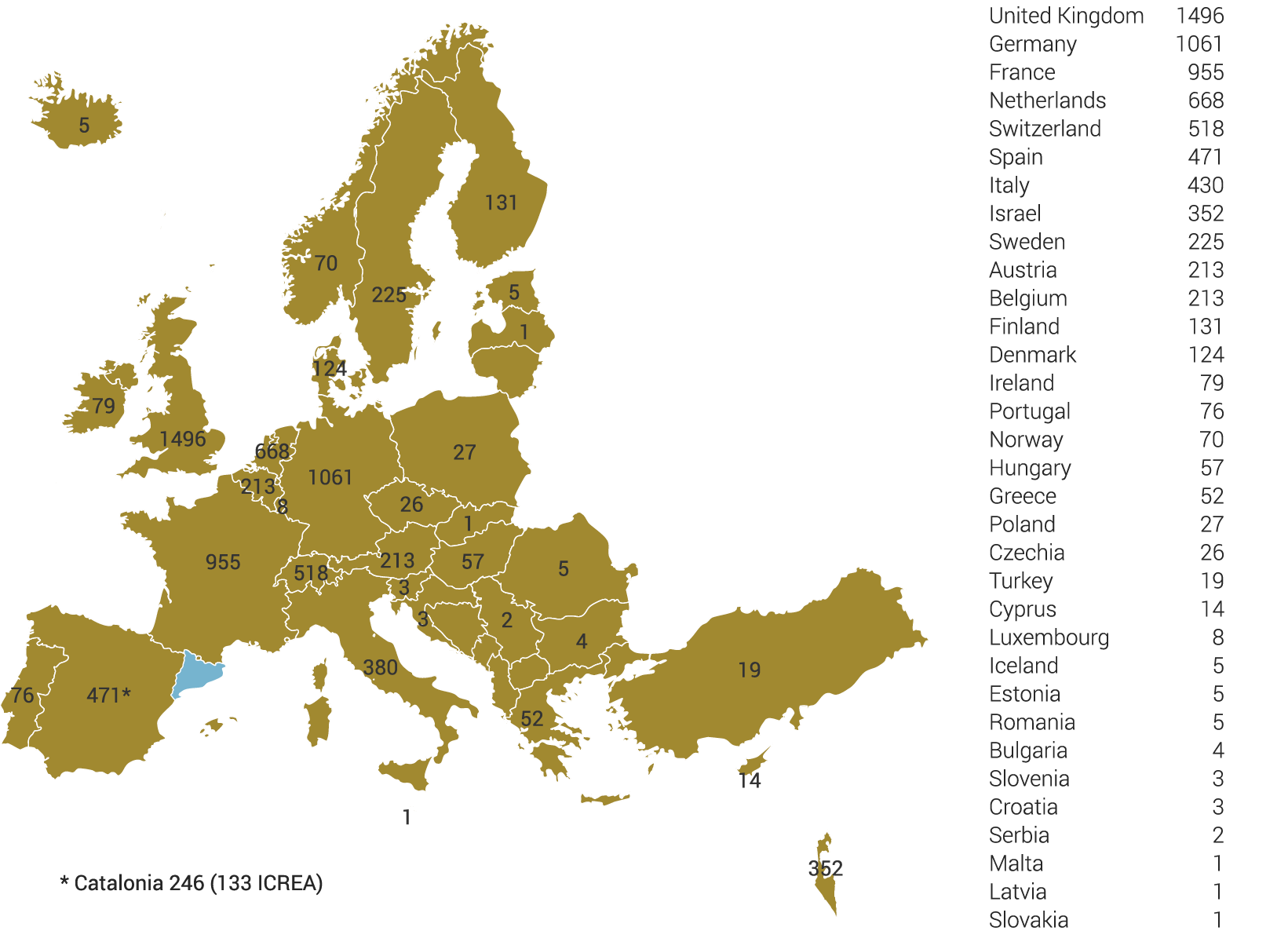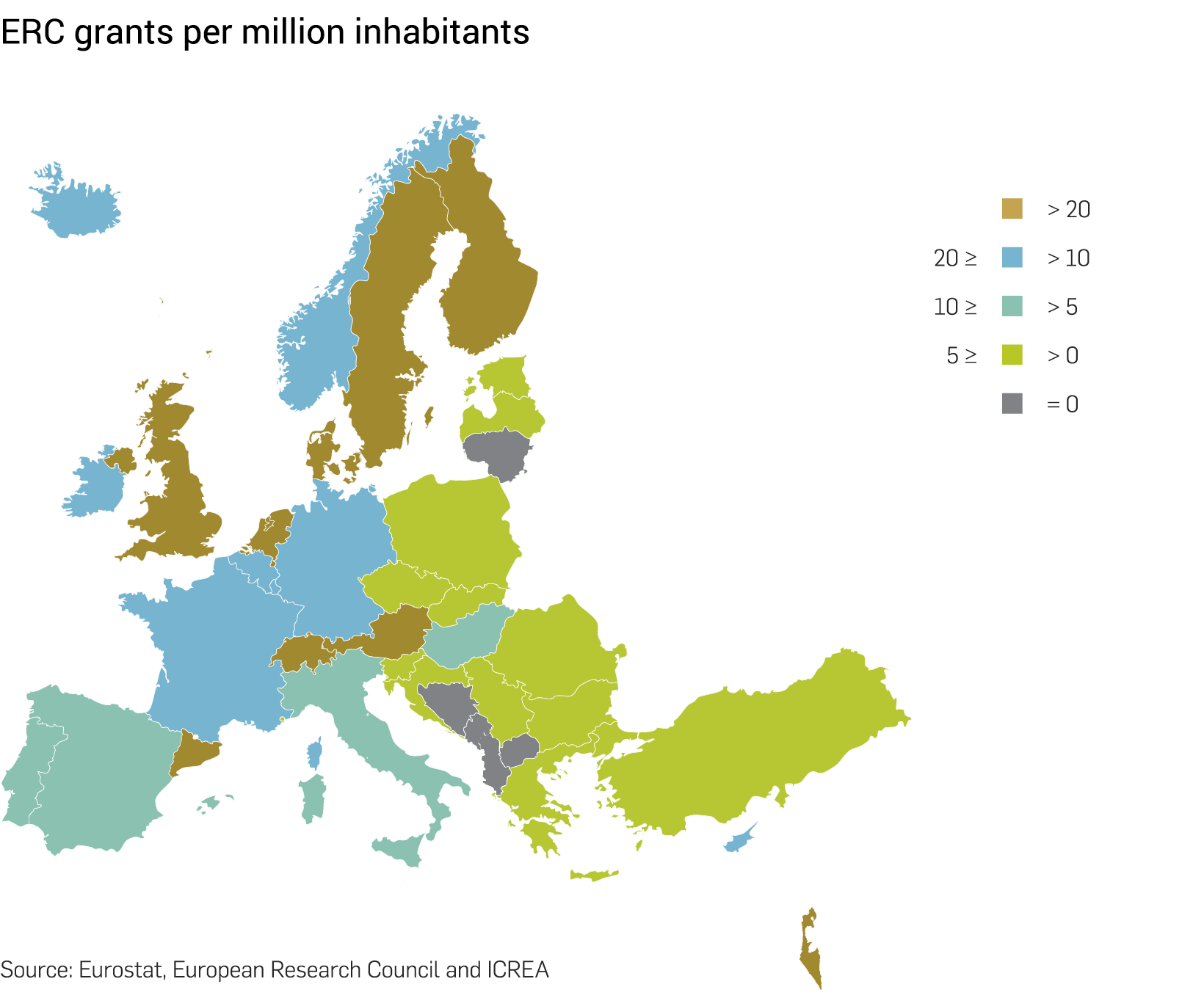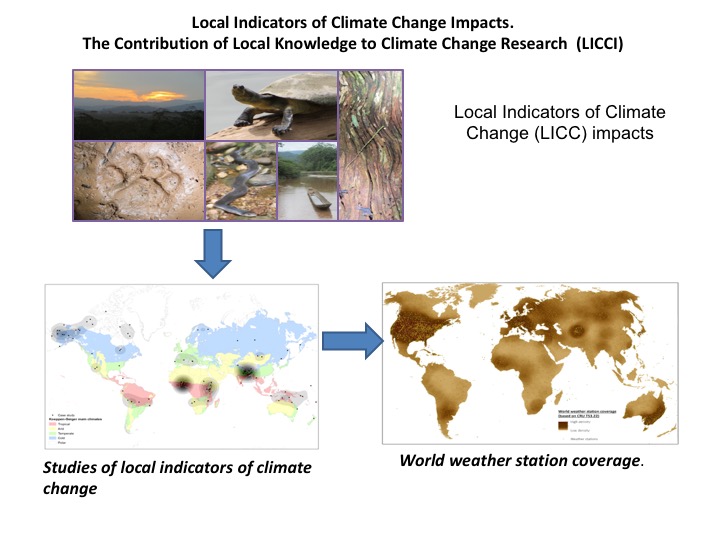European Research Council (ERC) grants support individual researchers who wish to pursue frontier research. In particular, the ERC encourages proposals that cross disciplinary boundaries, pioneering ideas that address new and emerging fields, and applications that introduce unconventional, innovative approaches. The ERC funding schemes are open to researchers of any nationality or age who wish to carry out their frontier research in the 28 EU member states or associated countries.
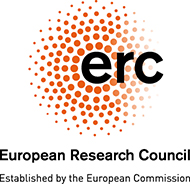
There are three ERC core funding schemes: Starting Grants, Consolidator Grants, and Advanced Grants, and two additional schemes: Proof of Concept and Synergy Grants. The latter did not open in 2017.
Distribution of ERC grants as of December 2017
ICREA’s share of ERC grants
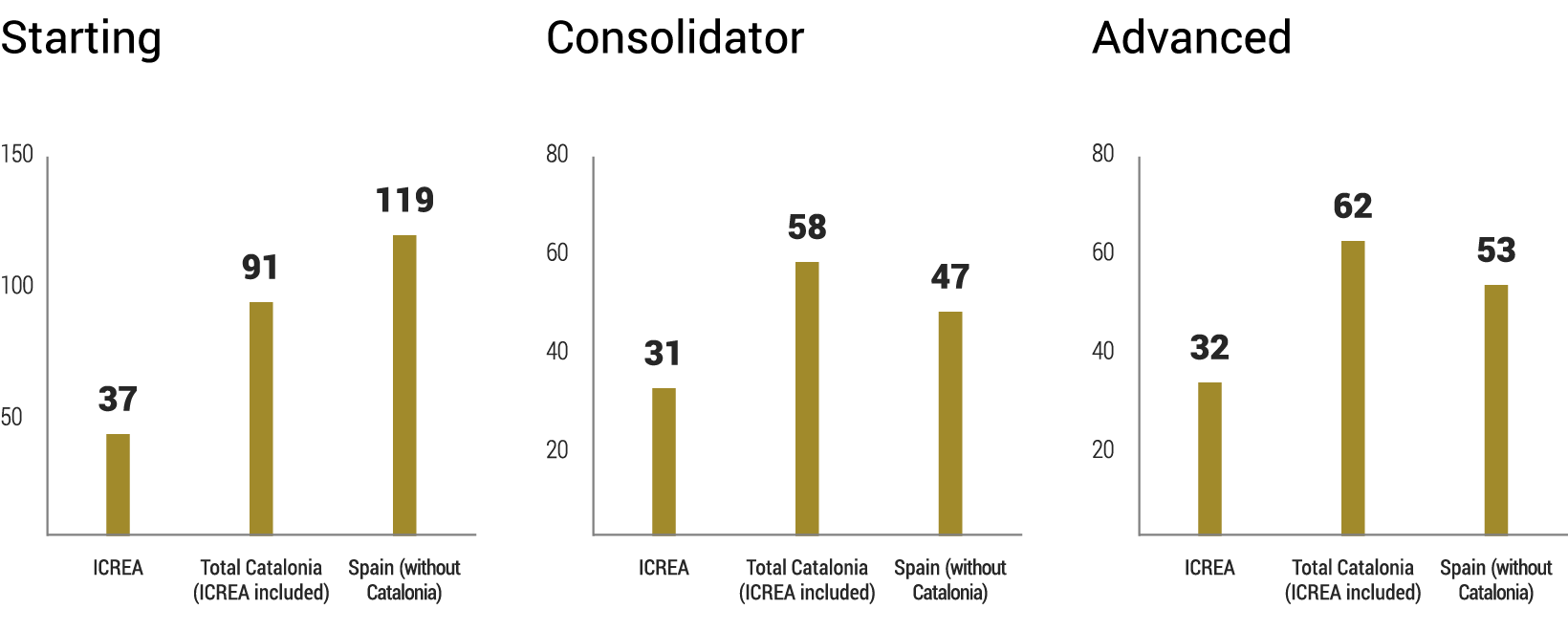
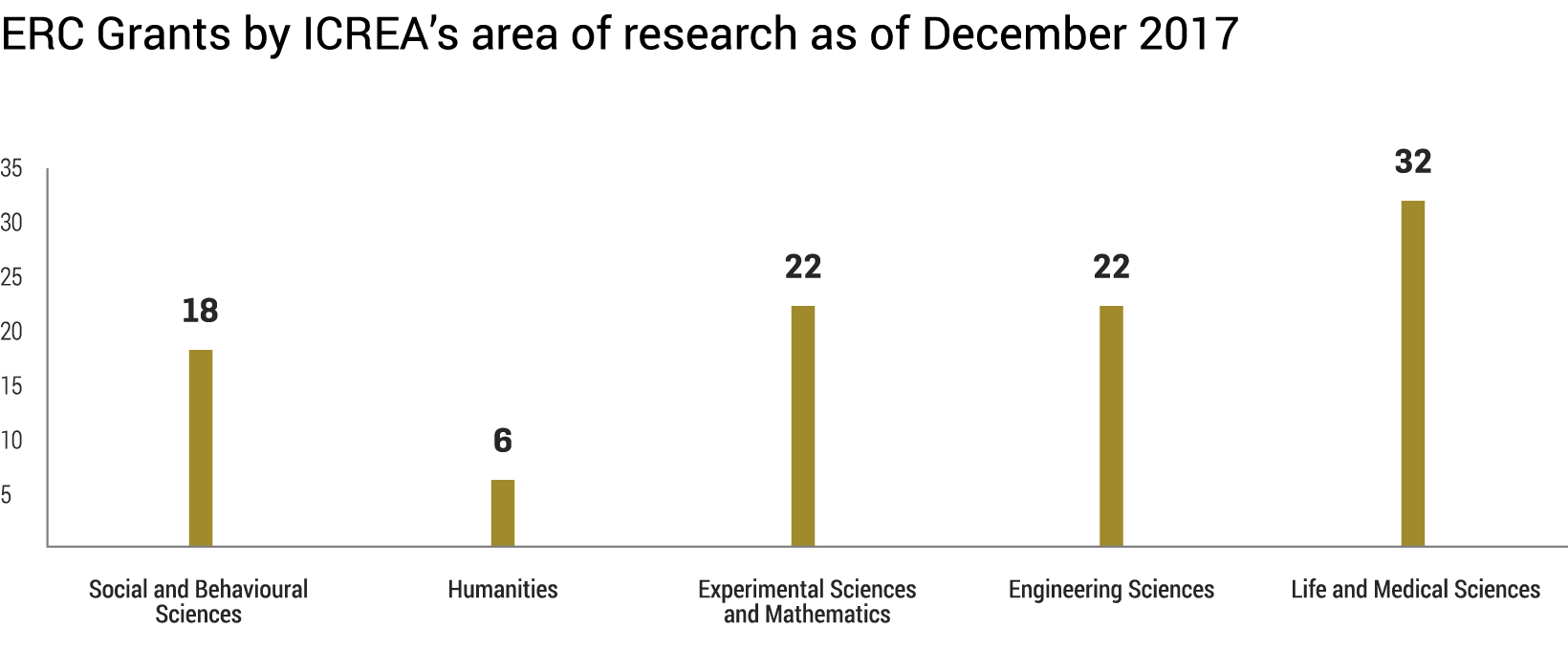
ICREA’s ERC awardees in 2017
Consolidator Grants (CoG)
CoG are designed to support researchers at the stage at which they are consolidating their own independent research team or programme. The scheme will strengthen independent and excellent recently created research teams. ICREA’s awardees in 2017:
Anna Alberni | Universitat de Barcelona (UB) | Social Sciences & Humanities
MiMus – Ioculator seu mimus. Performing Music and Poetry in medieval Iberia
 What was the role played by courtly musicians and poets in fostering a performative dimension of cultural life in the late Middle Ages? How did this contribute to the social value of the poet and musician as an artist? In the late medieval period the Crown of Aragon was a political and cultural crossroads, a coveted destination for artists of various kinds who attended the refined court of the Catalan kings. Musicians and performing entertainers with skills in the verbal and non-verbal domains were among the most sought after.
What was the role played by courtly musicians and poets in fostering a performative dimension of cultural life in the late Middle Ages? How did this contribute to the social value of the poet and musician as an artist? In the late medieval period the Crown of Aragon was a political and cultural crossroads, a coveted destination for artists of various kinds who attended the refined court of the Catalan kings. Musicians and performing entertainers with skills in the verbal and non-verbal domains were among the most sought after.
This project will review and expand the corpus of documentary evidence informing us about musical activity and performing artists at the court of Aragon in the late medieval period, with the aim to analyse what this tells us about similar activity at other European courts. Thus, it will examine the professional profiles, cultural backgrounds and networks of patronage behind the minstrels who thrived in the Catalan court between 1235 and 1435. The main source of information will be the Archive of the Crown of Aragon in Barcelona and the Archive of Valencia.
The project will also consider the debt of Catalan poetry to foreign musicians, with the aim to establish whether any intertextuality exists between Catalan poetry and the poetry produced in the regions adjacent to the territories of the Crown of Aragon that was specifically mediated by the presence of foreign musicians at the Catalan court.
Specific objectives of the project will be:
1) to establish whether the ideas of minstrelsy passed down to us by literature and scholarship fit the real profiles of minstrels provided by medieval documents;
2) to evaluate the impact, where appropriate, of contacts between religious and ethnic communities in the profession of minstrelsy in late medieval Iberia;
3) to assess the role of queenship in musical and poetic patronage;
4) to clarify the influence of foreign musical traditions on Catalan poetry.
Fyodor Kondrashov | Centre de Regulació Genòmica (CRG) | Life Sciences
CharFL – Characterizing the fitness landscapes on population and global scales
Viki Reyes García | Institut de Ciència i Tecnologia Ambiental de la Universitat Autònoma de Barcelona (ICTA - UAB)| Social Sciences & Humanities
LICCI – Local Indicators of Climate Change Impacts. The Contribution of Local Knowledge to Climate Change Research
In the quest to better understand local climate change impacts on physical, biological, and socioeconomic systems and how such impacts are locally perceived, scientists are challenged by the scarcity of grounded data, which has resulted in a call for exploring new data sources. People with a long history of interaction with the environment have developed complex knowledge systems that allow them to detect local impacts of climatic variability, but these insights are absent in climate change research and policy fora. I will bring insights from local knowledge to climate research by 1) providing data on local climate change impacts on physical (e.g., shrinking glaciers) and biological systems (e.g., phenological changes) and on perceptions of climate change impacts on socioeconomic systems (e.g., crop failure due to rainfall patterns change) and 2) testing hypotheses on the global spatial, socioeconomic and demographic distribution of local climate change impacts indicators.
Research will last five years. The first 18 months, Preparation, I will train a team who will develop and implement a data collection protocol and design a web-based platform where citizens can enter information onlocal climate change impacts indicators. During the following two years, Data collection, we willtrain 40 external PhD students to collect project’s data in data-deficient regions and disseminate the platform. During the last 18 months, Analysis, the core team will use spatial matching and multivariate analysis to test hypotheses related to the spatial, socioeconomic, and demographic distribution of local climate change impacts indicators. External PhD students will analyse local data. Dissemination will be transversal to the project. This project will fill theoretical and spatial gaps on climate change impacts research. It will also improve local capacity to respond to climate change impacts and help bridge epistemological differences between local and scientific knowledge systems.
Advanced Grants (AdG)
AdG allow exceptional established research leaders to pursue groundbreaking, high-risk projects that open new directions in their respective research fields or other domains. The AdG funding targets researchers who have already established themselves as independent research leaders in their own right. The results of the 2016 AdG call were made public in 2017. ICREA’s awardees:
Pura Muñoz | Universitat Pompeu Fabra (UPF)| Life Sciences
STEM-AGING – Tissue regeneration and aging: the decisive quiescent stem-cell state
The basic mechanisms of stem cell malfunction during aging are poorly understood even though they underlie the regenerative decline of most organs and tissues as we age. Based on our recent contributions (Nature 2014, Nature 2016), the fields of tissue regeneration and aging converge on the key role of the quiescent state, the preferred state of stem cells in low turnover tissues such as skeletal muscle. Our unifying hypothesis is that stem-cell quiescence maintenance, which requires active proteostasis (protein homeostasis), lies at the basis of stemness, and that its substitution by a senescence state in aging impairs regeneration. How these variables connect to drive stem cell aging is not known. Crucial experimental systems in this proposal are sensitive reporter mice for proteostasis, senescence and quiescence/fate in aging muscle stem cells.
The project is divided as follows:
Objective 1. Proteostasis and stem cell quiescence maintenance: tracing proteostasis in quiescent stem cells from autophagy and chaperone-mediated autophagy (CMA) reporter mice during aging / impact of autophagy/CMA loss on quiescence and regeneration / molecular regulators of proteostasis.
Objective 2. Proteostasis and quiescent stem cell heterogeneity and fate: asymmetric segregation of proteotoxic waste as an instructor of stem cell heterogeneity and regenerative fate.
Objective 3. The quiescence-to-senescence-switch in aging muscle stem cells: tracing and isolating senescent stem cells in senescence-cell reporter mice during aging / impact of senescent cell ablation on regenerating aged muscle.
Objective 4. Circadian regulation in the quiescent stem-cell state: impact of aging on circadian rhythms and consequences for quiescence maintenance and regeneration. We expect that completion of these objectives will provide new fundamental knowledge on stem-cell biology, regeneration and aging.
Mel Slater |Universitat de Barcelona| Social Sciences & Humanities
MoTIVE – Moments in Time in Immersive Virtual Environments
This project investigates how virtual reality (VR) can be used to live through an historical event so that participants perceive themselves to be there (Place Illusion) and take the events that are happening as real (Plausibility). To provide an application focus the research will be constructed around recreating a famous rock concert from the 1980s.
The specific elements of the research involve an Agent Based Model (ABM) that populates the environment with thousands of virtual characters with their behaviour driven by the music. This ABM will run in VR embedding participants as a type of agent. Agents will have personality and emotional state that can influence one another, and the actions and state of participants will also influence the unfolding of the model. Based on the predictive coding model of brain functioning a theory of Place Illusion will be developed that results in a universal measurement. Similarly, the Plausibility Illusion will be modelled and corresponding universal measure derived. Participants in VR will be embodied, so that they will have a first person perspective life-sized virtual body that moves as they do.
We will exploit the concept of body ownership and its consequences for attitudinal, behavioural, cognitive and agency changes to give people unique experiences of the virtual events, and carry out a series of experiments to assess the influence of being transported back in time in a younger body has on ageing. Our recent discovery that illusory agency can be realised through virtual embodiment will be used for research on improved motor learning. To allow people to move through the environment we will investigate paradigms for virtual walking, and in particular whether the multisensory principles involved in body ownership illusions can be used to lessen simulator sickness. The long term goal of the project is to understand how to capture treasured past moments lost in time, through their reproduction in ABM inspired virtual reality.
Jeroen van den Bergh | Institut de Ciència i Tecnologia Ambiental de la Universitat Autònoma de Barcelona (ICTA - UAB) | Social Sciences & Humanities
EVOCLIM – Behavioral-evolutionary analysis of climate policy: Bounded rationality, markets and social interactions
Distinct climate policies are studied with incomparable approaches involving unique criteria and impacts. I propose to unite core features of such approaches within a behavioral-evolutionary framework, offering three advantages: evaluate the effectiveness of very different climate policy instruments in a consistent and comparative way; examine policy mixes by considering interaction between instruments from a behavioral as well as systemic perspective; and simultaneously assessing policy impacts mediated by markets and social interactions.
The key novelty is linking climate policies to populations of heterogeneous consumer and producers characterized by bounded rationality and social interactions. The resulting models will be used to assess the performance of policy instruments – such as various carbon pricing and information provision instruments – in terms of employment, equity and CO2 emissions.
The approach is guided by 5 goals:
(1) test robustness of insights on carbon pricing from benchmark approaches that assume representative, rational agents;
(2) test contested views on joint employment-climate effects of shifting taxes from labor to carbon;
(3) examine various instruments of information provision under distinct assumptions about social preferences and interactions;
(4) study regulation of commercial advertising as a climate policy option in the context of status-seeking and high-carbon consumption; and
(5) explore behavioral roots of energy/carbon rebound.
The research has a general, conceptual-theoretical rather than a particular country focus. Given the complexity of the developed models, it involves numerical analyses with parameter values in realistic ranges, partly supported by insights from questionnaire-based surveys among consumers and firms. One survey examines information provision instruments and social interaction channels, while another assesses behavioral foundations of rebound. The project will culminate in improved advice on climate policy.
